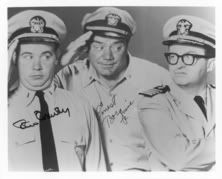"Our department provides military support to civil authorities as part of a comprehensive national response to prevent and protect against terrorist incidents or to recover from an attack or natural disaster," Paul McHale, assistant secretary of defense for homeland defense, testified to members of the SASC's Emerging Threats and Capabilities Subcommittee.
Katrina slammed into the Gulf area on Aug. 29, killing hundreds of people and causing widespread damage in coastal parts of Alabama, Mississippi and Louisiana. The storm's power breeched New Orleans' levee system and caused flooding of 80 percent of the city.
"DoD's deployment in response to the catastrophic events of Hurricane Katrina was the largest, fastest civil-support mission in the history of the United States," McHale pointed out to committee members.
More than 72,000 active-duty and National Guard soldiers were deployed to provide assistance in Katrina-ravaged areas between Aug. 29 and Sept. 10, he said.
McHale said that was more than twice the previous record deployment of military assets in response to a natural disaster since Hurricane Andrew in 1992.
DoD acted on more than 90 hurricane-related requests for assistance from civil authorities in the wake of Katrina, McHale said. Many requests, he said, were approved orally by Defense Secretary Donald H. Rumsfeld, including one that had an estimated cost of $1 billion.
"DoD felt a sense of urgency and acted upon it," McHale said.
The Defense Department acted on more than 140 requests for assistance from civil authorities in 2005, McHale said, including responses to Hurricane Dennis, Ophelia and Rita, as well as Katrina-related assistance.
And in response to conclusions drawn from President Bush's directed review of the overall federal response to Katrina, McHale noted: "We have already begun to implement improvements."
For example, DoD is developing preplanned responses for a multitude of possible disaster scenarios in order "to speed the response to a catastrophic event," McHale said. Part of that strategy, he said, involves developing closer coordination between the Department of Homeland Security and U.S. Northern Command, which is responsible for providing federal military assistance, if requested, for contingencies like natural disasters or other emergencies.
"We are developing a framework to provide initial damage reconnaissance," McHale said. "And I would note, that was one of our areas of deficiency during Katrina."
Commenting on observations about confusion between state and federal authorities during the response to Katrina, McHale pointed to the intricacies of the dual-command structure that exists between the state governors that command their Guard forces and the federal government.
"It's the Constitution of the United States," McHale explained. "It's the recognized authority both of the national government and of the state governments, creating a dual chain of command." Federalization of the National Guard is a presidential prerogative, but McHale believes such an action shouldn't be taken unless in the most dire circumstances.
"We retain that option when required, but we should not lightly execute it," he said. "When possible, we should preserve the command authorities of the governor (and) certainly respect the constitutional authorities of the president of the United States." Perhaps the best compromise in natural disaster situations like Katrina, McHale said, is "to preserve the two chains of command while insisting upon unity of effort through coordination."
Yet regardless of discussions over how Katrina was handled, the defense of the homeland is DoD's most fundamental duty, McHale said.
"Men and women in military uniform - active, reserve, and National Guard - will continue to meet that obligation with passion, professionalism and a resolute sense of purpose," he concluded.

